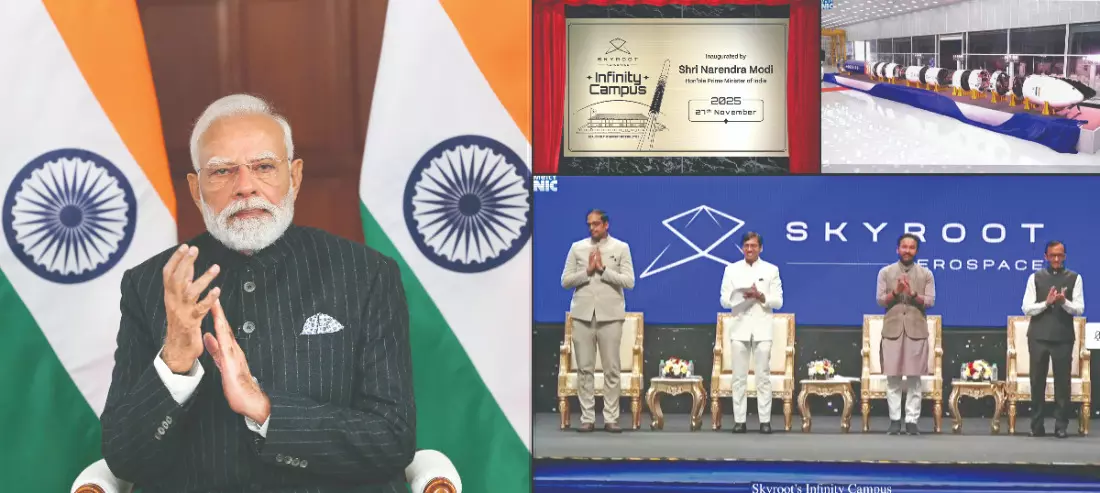PM unveils Skyroot’s 1st orbital rocket Vikram I, opens new Infinity Campus

Hyderabad: Prime Minister Narendra Modi on Thursday unveiled Skyroot Aerospace’s first orbital launch vehicle and opened the company’s new facility, calling it a symbol of India’s expanding private space landscape. The launch took place virtually, with the Prime Minister inaugurating Skyroot’s newly established Infinity Campus and presenting Vikram I, an orbital rocket designed to place satellites into space.
During his address, the Prime Minister said the rapid emergence of young scientists and engineers in private space companies represented a shift in the nation’s approach to innovation. Modi stated that “Gen Z engineers, Gen Z designers, Gen Z coders and Gen Z scientists are creating new technologies,” adding that the contribution of the younger generation was reshaping India’s presence in space.
Skyroot, founded by former ISRO scientists Pawan Chandana and Bharath Daka, has become one of India’s leading private space technology companies. The new campus spans approximately two lakh square feet and will serve as a full-scale hub for the design, development and testing of launch vehicles. With its current infrastructure, the company can produce one orbital-class rocket every month. The unveiling comes less than two years after Skyroot launched Vikram S in November 2022, becoming the first Indian private entity to send a rocket into sub-orbital flight.
Modi described the Infinity Campus as “a reflection of India’s new thought, innovation and the bigger youth power,” noting that the rising spirit of entrepreneurship, combined with technological capabilities, had opened new economic and scientific pathways. He said the government’s space sector reforms had paved the way for firms like Skyroot to thrive, creating an environment where private players could build and launch space systems independently.
The Prime Minister referred to India’s space programme as one that evolved from modest beginnings. He recalled how rocket components were once transported on bicycles and bullock carts before the Indian Space Research Organisation built what he called one of the world’s most trusted launch vehicles. According to Modi, the story of India’s space growth showed how determination could transform ambition into results. He added that more than 300 space startups were now operational in the country, each contributing new ideas and engineering solutions.
The PM said private participation was expanding across domains, including weather prediction, communication services, urban planning and national security. He explained that new policies and infrastructure such as In-Space had been created to support collaboration between government agencies, industry and startups. Plans to open parts of the nuclear sector to private industry are also being considered. An official statement earlier noted that the growing number of space enterprises was indicative of the large-scale reforms introduced under the NDA government, reinforcing India’s global presence in space. Modi said ISRO’s technology and facilities had been made accessible to startups, which had helped convert India’s space framework into a cooperative environment driven by research and industry participation over the past six to seven years. He noted that many startups began with three to five people working in confined spaces but continued to push boundaries regardless of limited resources.
The Prime Minister said India’s private space capabilities were attracting global investment interest. He pointed out that the demand for small satellites had risen worldwide, and enterprises in other countries were now seeking satellite manufacturing, launch support and technology partnerships within India. “India’s private space talent is making its own identity in the world,” he said, adding that the nation must take full advantage of this growing demand.
He also said that the youth were innovating propulsion technology, composite materials, launch vehicle stages and satellite systems, expanding into areas that were previously uncharted. Modi said that sectors such as FinTech, AgriTech, HealthTech, ClimateTech, EduTech and DefenseTech were seeing similar growth, driven by young problem solvers delivering modern solutions.
The Prime Minister also highlighted government efforts to strengthen research at the school level. More than 10,000 Atal Tinkering Labs have been set up to encourage creativity and scientific thinking among students, and work is underway to establish 50,000 additional labs. Modi credited the younger generation with prioritising national progress through research and entrepreneurship, saying they continued to pursue ambitious goals with conviction.



